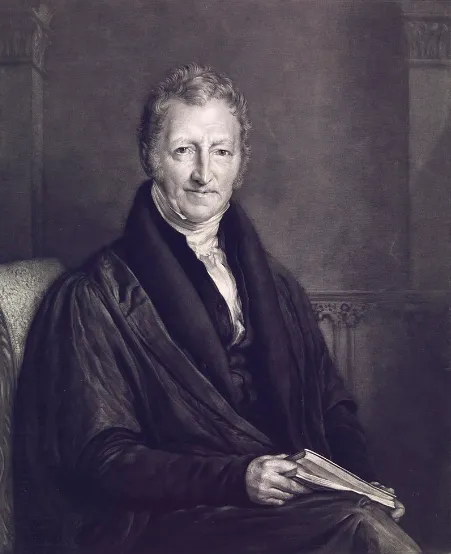The following is an excerpt from Chapter 1 of my upcoming book: "The Philosophical Farmer – Anti-Malthusian Thought in the Age of Extinction"
Enjoy - and please provide feedback where appropriate.

Malthusian thought is dead, or at least it should be. It represents one of those “bad ideas” that, while continuously disproved, never seems to die. While we will review in the next section the well-documented fact that this line of thinking is much older than the 18th century, which is when Mr. Malthus published his ideas, the life and times of this English thinker gives us a good jumping off point for our philosophical journey, as the ‘modern’ incarnation of this bad idea.
Thomas Robert Malthus, born in 1766, entered a world beginning to be thoroughly transformed by the English Industrial Revolution. His most known work, “An Essay on the Principle of Population”, was published in 1798, where he famously stated - "The power of population is indefinitely greater than the power in the earth to produce subsistence for man."
This is both the main thrust and the conclusion of Malthusian thought, which we will spend only briefly in breaking down. It is the assumption of a zero-sum situation, of limited resources coupled together with the exponential expansion of the human population size that necessitates the conclusion of famine and tragedy. And its not just me saying this, it was his actual conclusion that not only do lots of humans need to die, but that it would be ‘humane’ to kill lots of humans to avoid a starvation situation.
War and Pandemics were just two of his suggestions.
From here on out, we will be referring to this as ‘anti-human’ philosophy. If you believe in this, you can come to all sorts of conclusions that seem horrendous, but are really just naturally logical conclusions to a problem that has been framed. Humans are a burden, they are a problem to be dealt with.
And it is definitely the case that people believe this – starting with the current oligarchical power structure that is in place. Not only do they believe it, by framing modern challenges in ‘anti-human’ frames, they have gotten a whole lot of common folk to believe it as well, even if they don’t understand the philosophy behind it.
How many times have you heard that “Human beings are a cancer, a parasite on the planet”? We might as well go directly to the modern version of this, a monologue from Agent Smith in the first Matrix movie:
“I'd like to share a revelation that I've had during my time here. It came to me when I tried to classify your species. I realized that you're not actually mammals.
Every mammal on this planet instinctively develops a natural equilibrium with the surrounding environment but you humans do not.
You move to an area and you multiply and multiply until every natural resource is consumed, and the only way you can survive is to spread to another area.
There is another organism on this planet that follows the same pattern. Do you know what it is? A virus.
Human beings are a disease, a cancer of this planet. You are a plague, and we are the cure.“
– Agent Smith, The Matrix (1999).
Take a moment to think about that sentiment, now wholly ingrained into our culture. Does this ring true to you?
It might, a lot of people believe it nowadays.
But, as it turns out, its not true at all. In fact, there are no examples of humans ‘using up every natural resource’, but it sounds true because we do have some problems with over-consumption of renewable resources. Over-fishing the oceans comes to mind – and nowadays over 50% of fish consumed in the US comes from fish farming operations. And like in this example, something you will find with virtually every challenge we face is that wherever there is a problem, there are humans working to solve it – with technology, with design, with creativity.
That is the reality – that is the super power of human beings: Creativity. This is what the bible is referring to when it says we are made in the image and likeness of The Creator. Its not about physical appearance, its about a divine spark of creativity – the ability to see a problem, visualize a solution, and bring that solution to life.
And this is why Malthusian thought, which predicted massive starvation almost 300 years ago, has not come to pass even though the population of the Earth has increased by an order of magnitude to 8 billion now, from just 800 million in 1798 when Malthus was writing. The only starvation incidents, such as those in the 20th century, were caused by anti-human beliefs – making it some sort of a self-fulfilling prophesy, a theme we shall touch on again.
Malthusian thought is not true, and its never been true. But that doesn’t mean it isn’t dangerous.
Any other examples I can add? Let me know in the comments, be helpful and receive an upvote from me!